|
|
|
Sort Order |
|
|
|
Items / Page
|
|
|
|
|
|
|
| Srl | Item |
| 1 |
ID:
128862
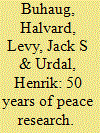

|
|
|
|
|
| Publication |
2014.
|
| Summary/Abstract |
Established in 1964, the Journal of Peace Research (JPR) celebrates 50 years. This anniversary special issue of the journal offers broad reviews of research areas that have been central both to the journal and to the field of peace and conflict research generally. An opening article co-authored by long-time editor Nils Petter Gleditsch offers a historical view on peace research and tracks trends in the use of 'peace' and 'violence' in titles of JPR across the first 49 volumes of the journal. Opening the review article section, two contributions address key thematic areas for the journal. Few if any subjects have attracted more attention in the study of international relations during the second half of JPR's first 50 years than the democratic peace, and in the extension of this subject, the broader debate about the liberal peace. Additional articles review the status and propose future developments in the study of war and its relationship with territory, ethnicity, ideology and natural resources. Another key historical topic associated with the journal concerns the economic cost of military conflict, while more recent research fields covered include terrorism and human rights, topics that have grown to become major JPR niches. Reflecting the methodological contributions by JPR, two articles focus on challenges of contemporary quantitative political analysis and progress in peace and conflict data collection. Finally, this special issue includes a review of research on international mediation in armed conflicts.
|
|
|
|
|
|
|
|
|
|
|
|
|
|
|
|
| 2 |
ID:
128871


|
|
|
|
|
| Publication |
2014.
|
| Summary/Abstract |
This article presents an eclectic review of the analytical study of terrorism that views all agents as rational decisionmakers. This analytical literature began in earnest with the seminal study of US skyjackings by William Landes in 1978. After 11 September 2001, the analytical literature on terrorism grew rapidly. Based on policy relevance, my survey article identifies five key areas of intense research interests. These include analyses of terrorist attack trends, the economic consequences of terrorism, the study of counterterrorism effectiveness, the causes of terrorism, and the relationship of terrorism and liberal democracies. New developments in the field focused on distinguishing key differences between domestic and transnational terrorism. Additionally, recent game-theoretic advances permitted more active agents and stages to the games. Other major developments involved the study of networked terrorists and the role of counterterrorism foreign aid. Fruitful future directions include using advanced econometric methods to discern the true impact of terrorism on growth, applying spatial econometrics to the study of terrorism, ascertaining the determinants of terrorist groups' longevity, and learning how to foster international counterterrorism cooperation.
|
|
|
|
|
|
|
|
|
|
|
|
|
|
|
|
| 3 |
ID:
128874
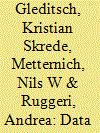

|
|
|
|
|
| Publication |
2014.
|
| Summary/Abstract |
We highlight how efforts to collect systematic data on conflict have helped foster progress in peace and conflict research. The Journal of Peace Research has played a key role in these developments, and has become a leading outlet for the new wave of disaggregated conflict data. We survey progress in the development of conflict data and how this interacts with theory development and progress in research, drawing specifically on examples from the move towards a greater focus on disaggregation and agency in conflict research. We focus on disaggregation in three specific dimensions, namely the resolution of conflict data, agency in conflict data, and the specific strategies used in conflict, and we also discuss new efforts to study conflict processes beyond the use of violence. We look ahead to new challenges in conflict research and how data developments and the emergence of 'big data' push us to think harder about types of conflict, agency, and the 'right' level of aggregation for querying data and evaluating specific theories.
|
|
|
|
|
|
|
|
|
|
|
|
|
|
|
|
| 4 |
ID:
128864
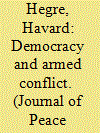

|
|
|
|
|
| Publication |
2014.
|
| Summary/Abstract |
The article reviews the literature on the relationship between democracy and armed conflict, internal as well as interstate. The review points to several similarities between how democratic institutions affect both conflict types. It summarizes the main empirical findings and discusses the most prominent explanations as well as the most important objections raised to the finding, empirically and theoretically. To a large degree, the empirical finding that pairs of democratic states have a lower risk of interstate conflict than other pairs holds up, as does the conclusion that consolidated democracies have less conflict than semi-democracies. The most critical challenge to both conclusions is the position that both democracy and peace are due to pre-existing socio-economic conditions. I conclude that this objection has considerable leverage, but it also seems clear that economic development is unlikely to bring about lasting peace alone, without the formalization embedded in democratic institutions.
|
|
|
|
|
|
|
|
|
|
|
|
|
|
|
|
| 5 |
ID:
128869
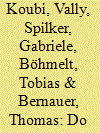

|
|
|
|
|
| Publication |
2014.
|
| Summary/Abstract |
This article reviews the existing theoretical arguments and empirical findings linking renewable and non-renewable natural resources to the onset, intensity, and duration of intrastate as well as interstate armed conflict. Renewable resources are supposedly connected to conflict via scarcity, while non-renewable resources are hypothesized to lead to conflict via resource abundance. Based upon our analysis of these two streams in the literature, it turns out that the empirical support for the resource scarcity argument is rather weak. However, the authors obtain some evidence that resource abundance is likely to be associated with conflict. The article concludes that further research should generate improved data on low-intensity forms of conflict as well as resource scarcity and abundance at subnational and international levels, and use more homogenous empirical designs to analyze these data. Such analyses should pay particular attention to interactive effects and endogeneity issues in the resource-conflict relationship.
|
|
|
|
|
|
|
|
|
|
|
|
|
|
|
|
| 6 |
ID:
128870


|
|
|
|
|
| Publication |
2014.
|
| Summary/Abstract |
There is a large literature on the economic costs of military conflict, which uses a variety of methods including accounting procedures, statistical models and event studies of how stock markets respond to news of conflict. This literature is not only subject to all the criticisms directed against cost-benefit analysis but also introduces an element of arbitrariness by not considering benefits. This article uses four questions to structure a discussion of the calculation of conflict costs. The first concerns the purpose of the calculation: why is it being done? The second concerns the counterfactual: what comparison is being made? The third concerns the data: where do the numbers come from? The fourth concerns aggregation and valuation: how are the elements of costs (over outcomes, time and individuals) combined? The literature is often not clear on the answers to these questions, tending to take them for granted. However, the answers are crucial to the calculation and are not merely technical matters but rest on both the underlying objective of the calculation and fundamental philosophical and ethical judgements.
|
|
|
|
|
|
|
|
|
|
|
|
|
|
|
|
| 7 |
ID:
128867
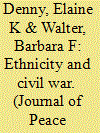

|
|
|
|
|
| Publication |
2014.
|
| Summary/Abstract |
If a civil war begins, it is more likely to be initiated by an ethnic group than any other type of group. We argue that ethnic groups, on average, are likely to have more grievances against the state, are likely to have an easier time organizing support and mobilizing a movement, and are more likely to face difficult-to-resolve bargaining problems. We further argue that each of these factors was likely due to three pre-existing patterns associated with ethnicity. First, when political power is divided along ethnic lines, ruling elites can disproportionately favor their own ethnic group at the expense of others. This creates grievances that fall along ethnic lines. Second, ethnic groups tend to live together in concentrated spaces, sharing the same language and customs, and enjoying deep ties with ethnic kin. This means that ethnic groups, if they are aggrieved, will have an easier time mobilizing support to demand change. Third, the fact that ethnic identity tends to be less elastic than other types of identity means that credible commitments to any bargain - before and during a conflict- will be more difficult to make. The result is that ethnic groups will have a greater number of reasons, opportunities, and incentives to mobilize and fight than non-ethnic groups.
|
|
|
|
|
|
|
|
|
|
|
|
|
|
|
|
| 8 |
ID:
128868
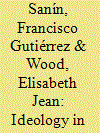

|
|
|
|
|
| Publication |
2014.
|
| Summary/Abstract |
How important is ideology for the analysis of civil war? In contrast to literature that neglects ideology in its emphasis on structural variables or situational incentives, this article argues for the recognition of its essential role in the functioning of armed groups if they are to explain observed variation in armed group behavior. For example, sidelining ideology leaves major phenomena unexplained, including both mass killing and restraint in violence against civilians. Ideology is defined as a set of more or less systematic ideas that identify a constituency, the objectives pursued on behalf of that group, and a program of action (perhaps only vaguely defined). Ideology matters in two ways. First, it has instrumental value for armed groups, socializing combatants with heterogeneous motivations into a coherent group, dampening principal-agent problems, prioritizing competing goals, and coordinating external actors including civilians. Ideologies differ in the kind of institutions and strategies they prescribe for meeting these challenges and in the extent to which they do so. Yet this first approach is incomplete, as ideology has more than instrumental value. Members of some armed groups act on normative commitments in ways not reducible to instrumental reasoning, and some groups constrain their strategic choices for ideological reasons, often normative concerns prescribed by their ideology. Some groups, for example, engage in restraint, declining to use violence though it would have strategic benefit. The conclusion lays out a twin-fold research agenda: a 'weak program' that analyzes the instrumental adoption of ideology and a 'strong program' that explores normative commitments based on particular ideologies and on social preferences.
|
|
|
|
|
|
|
|
|
|
|
|
|
|
|
|
| 9 |
ID:
128863
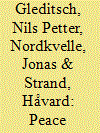

|
|
|
|
|
| Publication |
2014.
|
| Summary/Abstract |
The concept of peace has been under discussion in peace research from its start over 50 years ago. This article reviews the debate on broader and narrower conceptions of peace and investigates empirical patterns in the first 49 volumes of Journal of Peace Research, with some comparisons with Journal of Conflict Resolution. Negative peace, in the sense of reducing war, was the main focus in peace research from the inception. But positive peace, in the sense of cooperation or integration, has also always been on the peace research agenda, as reflected in the contents of both journals. Over time, a larger share of the articles in JPR has 'violence' or related terms in the title, while the incidence of the word 'peace' is fairly stable. Furthermore, articles on peace generally have fewer citations than those with violence-related terms. A broad concept of peace, as encouraged by the definition of positive peace as the reversal of structural violence, was popular in peace research for a decade or so, but has largely evaporated. To some extent, peace research has returned to its original agenda, although the main attention has shifted from interstate war to civil war and to some extent to one-sided and non-state violence. Articles dealing with patterns of cooperation, the traditional meaning of positive peace, now tend to address the liberal agenda and ask how they can foster a reduced probability of violence. Despite the 'gender gap', the increasing share of female authors in the journal appears to have had little influence on these developments although it may well have had other effects.
|
|
|
|
|
|
|
|
|
|
|
|
|
|
|
|
| 10 |
ID:
128865
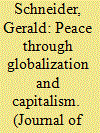

|
|
|
|
|
| Publication |
2014.
|
| Summary/Abstract |
The security externalities of globalization and capitalism continue to play an influential role in peace research. Typical contributions to these interrelated areas of scientific inquiry address the hope that the external openness (commercial liberalism) and the internal freedom of an economy (capitalist peace) pacify interstate as well as intrastate relations. I claim, despite the empirical support both theses have received, that they face considerable analytical hurdles. Commercial liberalism has, on a theoretical level, not yet moved much beyond the opportunity cost arguments that enlightenment philosophers first advanced more than 200 years ago. The capitalist peace research program similarly does not offer clear micro-level mechanisms explaining why the interactions between economic agents and political decisionmakers should be more peaceful in capitalist than in state-dominated economies. Drawing on the political economy literature, I argue that economic liberalism should distinguish between level- and change-effects of both globalization and capitalism and that thinking in analogies between domestic and interstate peace has prevented the field from making analytical headway. Both literatures will only profit from the advent of 'big data' in the case that the field addresses the theoretical challenges upfront.
|
|
|
|
|
|
|
|
|
|
|
|
|
|
|
|
| 11 |
ID:
128873
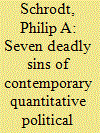

|
|
|
|
|
| Publication |
2014.
|
| Summary/Abstract |
A combination of technological change, methodological drift and a certain degree of intellectual sloth, particularly with respect to philosophy of science, has allowed contemporary quantitative political analysis to accumulate a series of dysfunctional habits that have rendered much of contemporary research more or less meaningless. I identify these 'seven deadly sins' as: Garbage can models that ignore the effects of collinearity; Pre-scientific explanation in the absence of prediction; Excessive reanalysis of a small number of datasets; Using complex methods without understanding the underlying assumptions; Interpreting frequentist statistics as if they were Bayesian; A linear statistical monoculture that fails to consider alternative structures; Confusing statistical controls and experimental controls. The answer to these problems is not to abandon quantitative approaches, but rather engage in solid, thoughtful, original work driven by an appreciation of both theory and data. The article closes with suggestions for changes in current practice that might serve to ameliorate some of these problems.
|
|
|
|
|
|
|
|
|
|
|
|
|
|
|
|
| 12 |
ID:
128872


|
|
|
|
|
| Publication |
2014.
|
| Summary/Abstract |
Why do governments abuse human rights, and what can be done to deter and reverse abusive practices? This article examines the emerging social science on these two questions. Over the last few decades, scholars have made considerable progress in answering the first one. Abuse stems, centrally, from conflict and institutions. Answers to the second question are more elusive because data are scarce and the relationships between cause and effect are hard to pin down. Lively debates concern the effectiveness of tools such as military intervention, economic policy, international law, and information strategies for protecting human rights. The evidence suggests that despite the explosion of international legal instruments, this strategy has had impact only in special circumstances. Powerful states play central roles in protecting human rights through sanctions, impartial military intervention, and other tools - often applied unilaterally, which suggests that there is an ongoing tension between the legitimacy of broad multilateral legal institutions and narrower strategies that actually work. The best approaches to managing human rights depend on the political organization of the abuser. Where strong centralized organizations are the problem, the best strategies alter the incentives of leaders at the top; where abuse arises from disarray, such as during civil war or fragile democratic transition, the key tasks include reducing agency slack and making organizations stronger and more accountable
|
|
|
|
|
|
|
|
|
|
|
|
|
|
|
|
| 13 |
ID:
128875
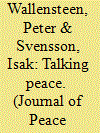

|
|
|
|
|
| Publication |
2014.
|
| Summary/Abstract |
Mediation, as a means to end armed conflicts, has gained prominence particularly in the past 25 years. This article reviews peace mediation research to date, with a particular focus on quantitative studies as well as on significant theoretical and conceptual works. The growing literature on international mediation has made considerable progress towards understanding the conditions under which mediation processes help bring armed conflicts to peaceful ends. Still, the field of international mediation faces a number of problems. In this article, we aim to identify findings on mediation frequency, strategies, bias, and coordination as well as on trends in defining success. Although previous research has generated important insights, there are still unresolved issues and discrepancies which future mediation research needs to explore. Many of the challenges that the field faces could be managed by giving greater attention to accumulative knowledge production, more disaggregated analysis, and a closer dialogue between policy and research.
|
|
|
|
|
|
|
|
|
|
|
|
|
|
|
|
| 14 |
ID:
128866
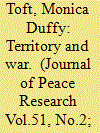

|
|
|
|
|
| Publication |
2014.
|
| Summary/Abstract |
In the past four decades scholars have produced a large literature on the relationship between territory and war. What is clear is that territory has been and will continue to be a core issue in explaining the escalation and onset of war and that territory has peculiar features that impact whether and how a conflict evolves and ends, and the nature of the peace that follows. These dynamics have received significant consideration theoretically and empirically. Although research initially centered on interstate wars, focus broadened to include intrastate or civil wars. On the methodological side, scholarship has taken a quantitative shift. The article concludes that both theorizing and empirical testing have become increasingly sophisticated.
|
|
|
|
|
|
|
|
|
|
|
|
|
|
|
|
|
|
|
|
|